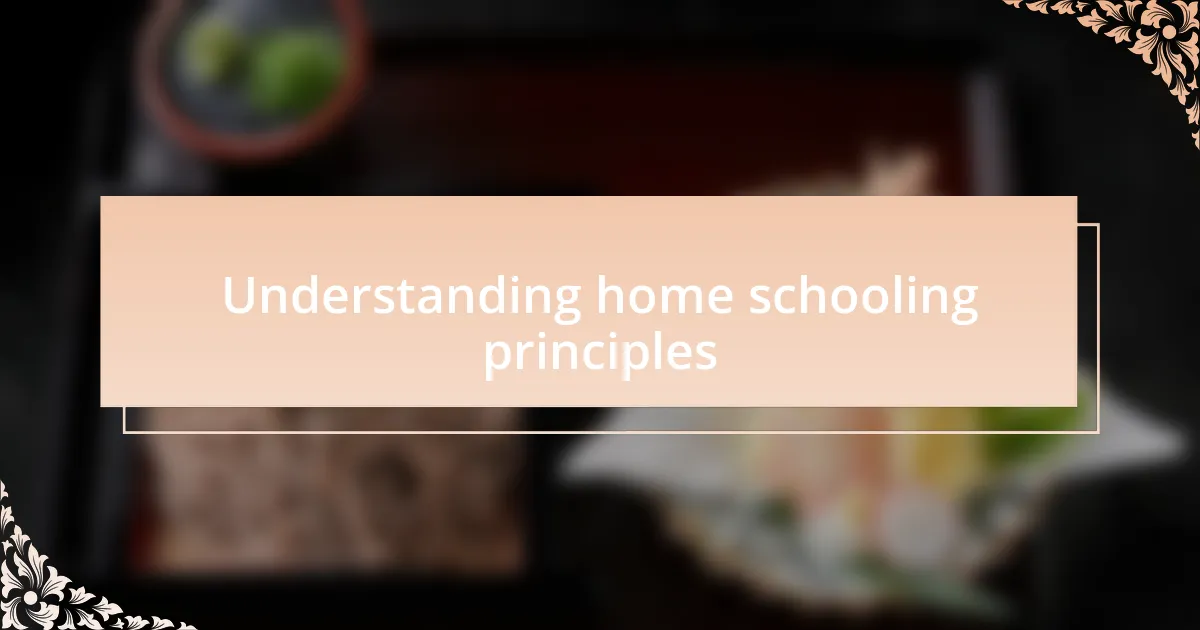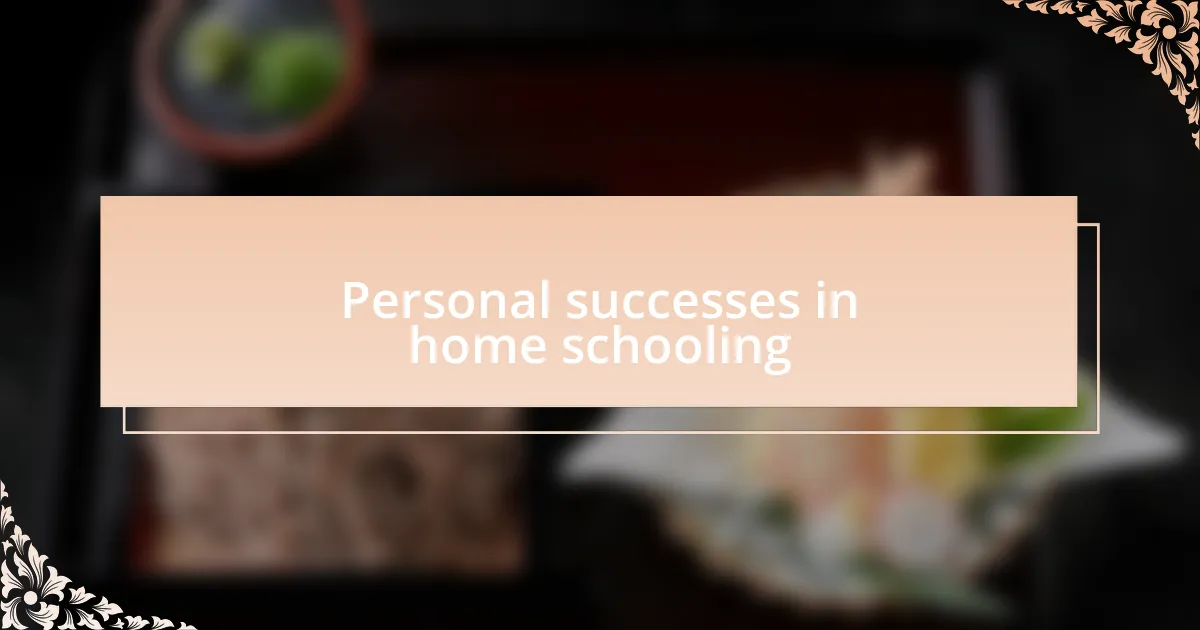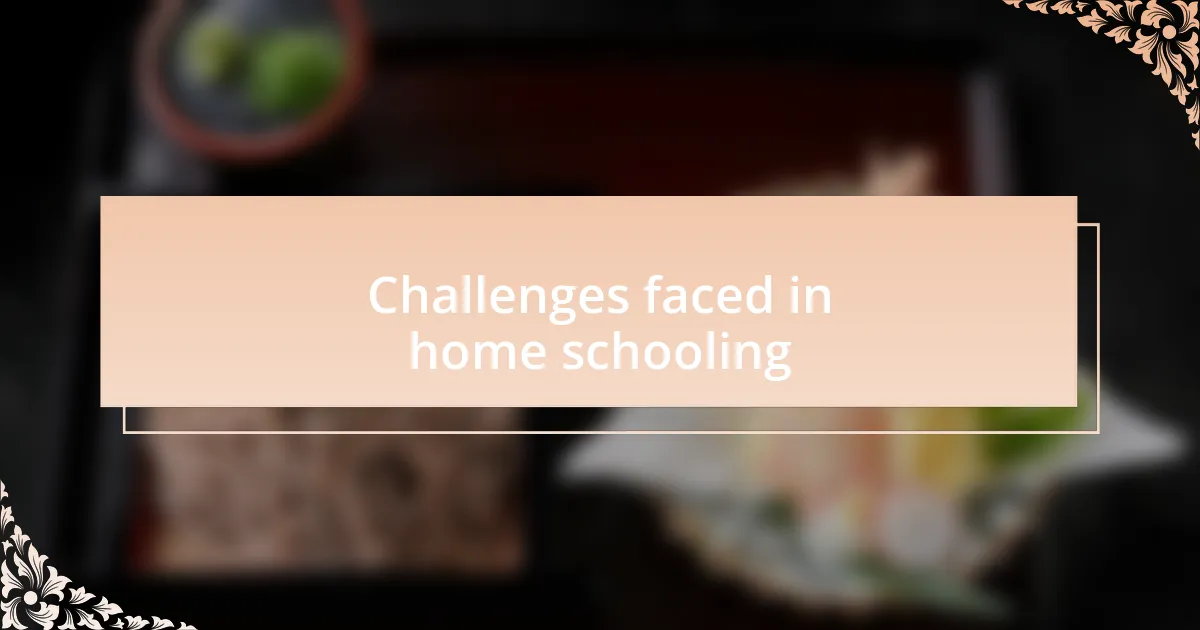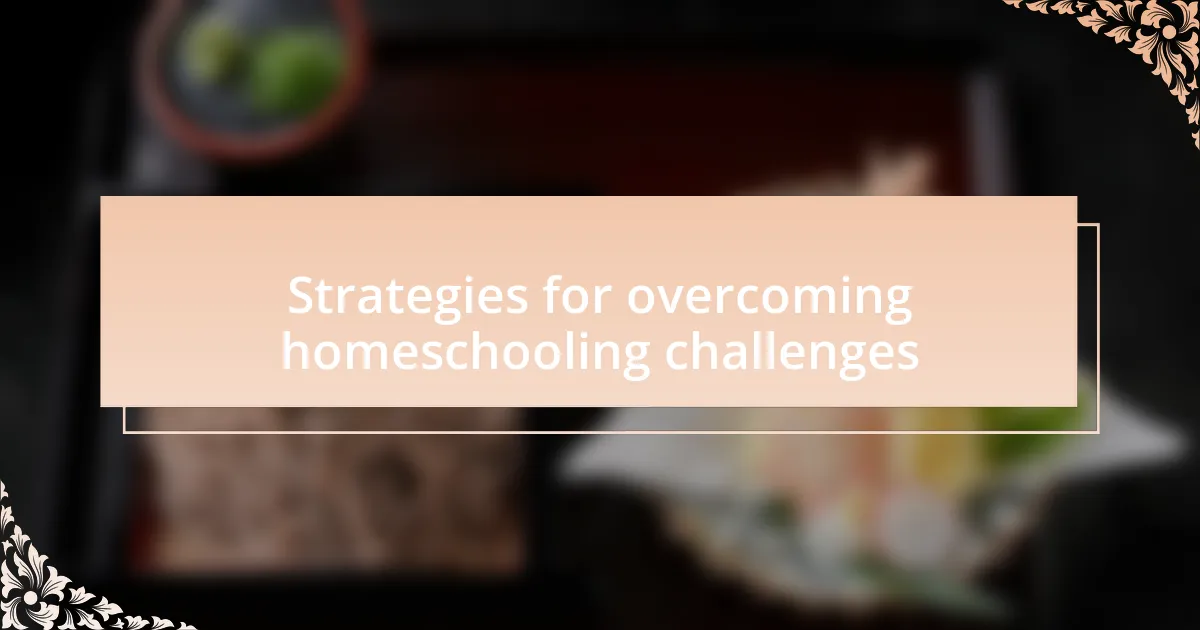Key takeaways:
- Home schooling allows for personalized education that adapts to a child’s interests and learning pace, fostering deeper engagement and understanding.
- Real-world experiences, such as field trips and hands-on activities, enhance learning by making concepts more relatable and impactful.
- Challenges include time management, ensuring socialization, and emotional fluctuations, which require strategies like flexible routines and mindfulness techniques.

Understanding home schooling principles
Home schooling is centered around tailoring education to fit each child’s unique needs and interests. I remember the sense of freedom I felt when I first introduced a self-paced learning system at home. It was liberating to let my child explore topics that sparked their curiosity, rather than adhering strictly to a conventional curriculum.
At the heart of home schooling is the idea that learning can happen anywhere and anytime. One afternoon, we turned our kitchen into a science lab, experimenting with baking soda and vinegar, which turned out to be an unforgettable lesson on chemical reactions. Isn’t it amazing how everyday activities can transform into educational experiences when we approach them with intention?
Another key principle is fostering a strong relationship between the educator and the learner. I’ve found that this connection not only enhances learning but also deepens trust. How often do we overlook the importance of this bond in traditional school settings? With home schooling, I’ve seen firsthand how deeper engagement leads to greater enthusiasm in learning.

Benefits of home schooling
The flexibility of home schooling has been one of the most rewarding aspects for our family. I recall a winter day when we decided to substitute a math lesson for a fun in-home treasure hunt where we incorporated math problems at each clue. It not only made learning enjoyable but also fostered teamwork and problem-solving skills. Who knew I could turn a cold day into a memorable educational adventure?
One significant advantage is the ability to incorporate real-world experiences into lessons. I once took my child to a local farmer’s market, and we turned the trip into an engaging lesson about economics and nutrition. By connecting concepts to real life, I noticed a spark in my child’s understanding—it’s as if the world became the textbook. Doesn’t it feel more impactful to learn through hands-on experiences rather than from a page in a book?
Additionally, home schooling allows for individualized pacing. I remember a time when my child struggled with a particular science concept, and we spent an extra week diving deep into it together. That focused attention meant overcoming barriers, enhancing not just knowledge but confidence too. Don’t you think everyone deserves the chance to learn at their own rhythm?

Personal successes in home schooling
I’m proud of the unique ways my home schooling journey has unfolded. One memorable experience was when my child created a documentary on our family history. It involved researching, writing scripts, and even filming interviews with relatives. Watching my child’s eyes light up as they pieced together our story made it clear how empowering learning can be when it resonates on a personal level. Have you ever thought about how a project like this could deepen a child’s connection to their heritage?
Another success was our exploration of the arts. I remember one rainy day when we dedicated a whole week to painting and drawing. It started as a simple project but evolved into an expressive outlet for my child. The joy on their face as they created their artwork was priceless. Isn’t it amazing how boosting creativity can also enhance other academic areas? I’ve noticed a correlation between their artistic expression and improved problem-solving skills in math—an unexpected yet wonderful connection!
I’ve also found immense value in building a routine that suits us. For instance, establishing morning quiet time for reading has transformed our days. In those moments, I often catch my child immersed in a book, completely engaged. It’s a sign that creating a comfortable environment can lead to self-motivated learning. How often do we underestimate the power of a well-structured routine in fostering a love for learning?

Challenges faced in home schooling
In my experience, one of the significant challenges of home schooling is managing time effectively. Balancing lesson planning with everyday responsibilities can feel overwhelming. I vividly recall a day when my schedule completely derailed because my child was particularly curious about a topic, and instead of following my rigid timetable, I chose to embrace that curiosity. However, this spontaneity led to a chaotic week with several subjects left behind. Have you ever struggled to keep the structure while allowing space for exploration?
Another hurdle I encountered was the socialization aspect. While I appreciate the focused learning environment at home, I worried about my child missing out on peer interactions. I remember arranging a playdate with other home-schooled kids. The moment my child laughed and connected with their friends, I realized how essential it is to actively seek out those social opportunities. Do you think this is a common concern among many home educators trying to strike that balance?
Finally, the emotional rollercoaster can be taxing for both parent and child. There are days filled with excitement and new discoveries, but there are also moments when frustration runs high, especially during challenging subjects. I can recall a math lesson that ended in tears—not only theirs but my own, as I struggled to explain a concept that seemed simple to me. In those instances, I’ve learned the importance of patience and the need to take breaks. How do you cope with the emotional highs and lows that come with this journey?

Strategies for overcoming homeschooling challenges
When I encountered obstacles in homeschooling, one strategy that really helped was setting a flexible routine. I remember creating a loose daily framework rather than a strict schedule. This allowed my child to thrive in moments of curiosity while still ensuring we covered essential topics. Have you found that a little flexibility can lead to more meaningful learning experiences?
Another effective approach for me was to incorporate hands-on activities and real-world learning. I noticed that themes come alive when I connect lessons to everyday tasks. For example, involving my child in meal preparation made math and science dynamic. It was one of those delightful moments when we turned a cooking session into a lesson on fractions and chemical reactions. Isn’t it fascinating how life offers opportunities to learn?
When facing emotional challenges, I’ve found that practicing mindfulness techniques together can be incredibly beneficial. During particularly tense lessons, we would take deep breaths or even step outside for a quick walk. These breaks not only recalibrated our emotions but also opened doors to spontaneous discussions about nature or life skills. How do you manage those peaks of frustration in your home?